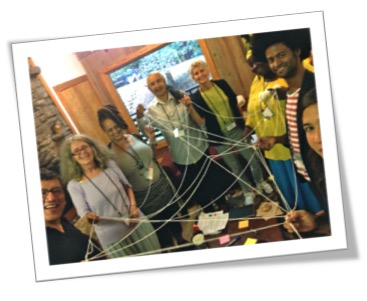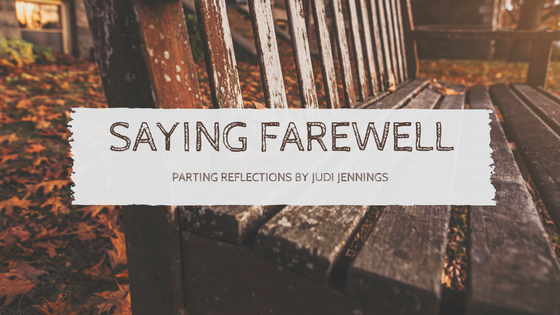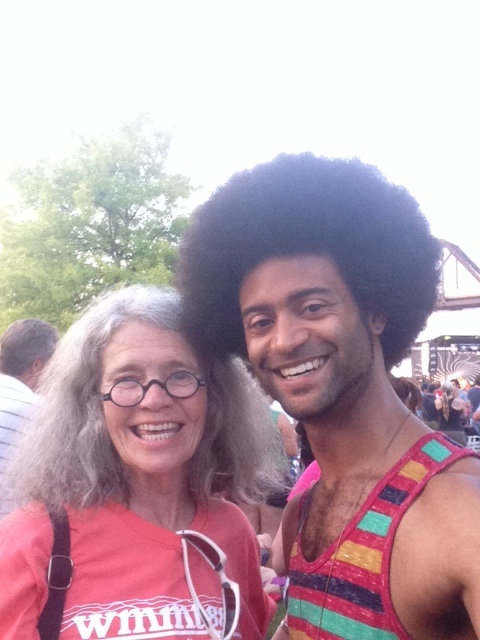Can cultural work and arts philanthropy address structural racism, advance economic equity, and contribute to what Dr. King described as the slowly bending arc of the moral universe toward justice? Today, thousands, if not tens of thousands of cultural producers, artists, and funders would answer with a resounding YES!
But it hasn’t always been so. For much of the 20th century, mainstream arts philanthropy in the US rested squarely on economic and racial privilege, urban dominance, western European aesthetics, and a narrow definition of forms of cultural production considered worth funding.
I entered the field of arts philanthropy in September 1998 as Executive Director of the Kentucky Foundation for Women, which funds feminist art for social change. That October, I attended my first meeting of Grantmakers in the Arts. The gathering comprised many smart, dedicated individuals and was also undeniably dominated by large private foundations concentrated in the urban northeast and California.
There have always been creatives, activists, and funders who resisted this kind of cultural oligarchy. By the late 1990s, a group of resistors was coalescing inside Grantmakers in the Arts, largely through the magnetic power of Claudine Brown, already a legendary program officer at Nathan Cummings Foundation. I soon joined this small but mighty band of resistors.
It didn’t really seem like a hard choice. I entered the national conversation about philanthropy to speak about the strengths and challenges facing people in Kentucky, especially rural and poor people. As a middle aged white woman, I may have been able to cut my hair, change my accent, and blend into the oligarchy. But it seemed that being true to most Kentucky people meant resisting.

Roberto Bedoya, Judi Jennings, Denise Brown, Edward Wemytewa, Pam Korza, Tufara Waller Muhammad, Ron Ragin, Jenny Lee
In the early 2000s, growing numbers of us connected during GIA’s annual conferences, in Minneapolis, Charlotte, Cleveland, and Pasadena. Many, like me, were from small, locally based foundations or public agencies. Some, like Caron Atlas, Carlton Turner, and MK Wegmann, were doing the work on the ground.
Many of us got up early for breakfast roundtables and stayed up late to talk at the bar. We all learned a lot from Claudine. As Claudine later told Maurine Knighton, her successor at NCF, “For me, leadership in this field is about appreciating who does good work, who has good ideas, and how that can be cumulated in a way that makes people feel like they’re part of something larger than themselves.” As Maurine says, that is easier said than done. And Claudine always led with grace and respect.
In 2005, Katrina laid bare American racism and inequities on television screens across the globe. Fueled by these undeniable images of injustice, more cultural funders wanted the arc to bend. Scores of GIA participants filled two meeting rooms at the 2007 conference in Taos, New Mexico eager to learn more about the connections among art, culture, social justice and philanthropy. The next year in Atlanta, GIA held its first of three pre-conferences on Art and Social Justice, encompassing a wide range of artists, activists, and funders.
At the 2010 GIA Conference in Chicago, Caron Atlas of Arts & Democracy and Tia Oros Peters of the Seventh Generation Fund inspired a new level of dialogue in their session on Breaking Out of a Bifurcated World: A Bridge Conversation on Philanthropy. Participants bravely acknowledged how “the practices and structures of philanthropy can create silos and disconnect funders from their cultures, their grantees, and their full selves.” Tears, laughter, and camaraderie reverberated, as straight and LGBTQ funders and cultural workers from working class origins, reservations, and various racial and ethnic backgrounds described themselves as shape-shifters whose work lives were both “powerfully transformative and painfully fragmented.” That same year, Animating Democracy produced a report on Art & Social Change Grantmaking, asking Trend or Tipping Point? The arc was bending.
After the Chicago conference, those of us who had organized the pre-conference formed an Art, Culture and Social Justice Working Group to consider options for growth and more frequent meetings. That same year, as Claudine prepared to leave the field of philanthropy, she asked me and Tim Dorsey, then of the Open Society Foundations, to head up the Working Group. Tim introduced the group to a wonderful network facilitator, Maura Bairley.
At convenings at the Penn Center in South Carolina and Alternate ROOTS annual meeting and artists retreat in North Carolina, Maura coached, inspired, and supported our group as we began to transform into an independent network. Ron Ragin, a dynamic new group leader, and I worked together as co-coordinators. Then in 2013-14, Ron led the establishment of this network as an independent platform for connections open to all who believe in the power of art and culture to advance social justice.
In 2014, I retired from my position as Executive Director of the Kentucky Foundation for Women after more than 15 years. My participation in the informal gatherings, working group and network enriched and defined much of my work at KFW. After my retirement, I rejoined the network to serve as coordinator for a year and then another year on the Leadership Team.
And now it’s time to say goodbye, confident of the joy, energy, brilliance and commitment to justice of young leaders in the field today. I leave the network in the strong hands of a talented facilitator, communications maven, and a stellar Leadership Team. This network is more important now than ever. The US and the entire globe stand in great need of the transformative powers of arts, culture, and social justice. As we continue to resist cultural dominance of all forms, I believe with Dr. King that the arc of the moral universe will continue to bend toward justice.


Judi
Your tireless work for racial& social justice has been an inspiration to me.
Hope to see you before long, to celebrate your work in person.
Thanks so much, Diane! Appreciate your important work in California! When KY and California can get together, good things will happen for sure!
Judi, your work for our movement at the nexus of art, culture, and social justice is life long. I well remember your efforts to sustain that movement in Kentucky throughout the ‘80s. I cherish the memory of a farewell conversation with you in Frankfort, where you bade me farewell and provided sage advice as I prepared to leave for a stint with the American Friends Service Committee in California. Yes, you have applied your hand to bending the arc, but you have also sustained others attempting the same. You may bid farewell now, but I know that the contributions you continue to make will fold into an established legacy that will nourish the movement for a long, long time.
Thanks so much, dear friend. And thanks for being a resistor and arc bender yourself! Peace and love always, Judi J